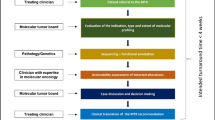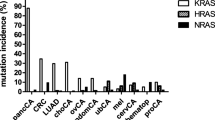We studied the association of polymorphic markers of cell cycle control genes (Arg72Pro of the TP53 gene, T(-410)G of the MDM2 gene, and Ser31Arg of the CDKN1A gene) in ovarian cancer and progression-free survival following platinum-based chemotherapy. Tumor tissue samples obtained from 49 patients who had undergone chemotherapy were examined. Patients received standard platinum-based chemotherapy and were observed until disease progression. Polymorphic markers of genes were evaluated by PCR-RFLP and real-time PCR. In patients carrying the G allele of the T(-410)G marker of the MDM2 gene, a decreasing trend was observed in median progression-free survival. An increase in the median progression-free survival was observed in carriers of the Pro allele of the TP53 gene (p=0.045). Furthermore, a stronger association was noted with carriers of the minor Pro/Pro homozygous genotype relative to the Arg/Arg genotype (p=0.007). In the subgroup of patients who underwent optimal or complete cytoreductive surgery, carriage of the minor Arg allele of the Ser31Arg marker (CDN1A gene) was associated with a decrease in the median progression-free survival time (p=0.004).
Similar content being viewed by others
References
Malignant Neoplasms in Russia in 2018 (Morbidity and Mortality). Kaprin AD, Starinskii VV, Petrova GV, eds. Moscow, 2019. Russian.
Bartel F, Jung J, Böhnke A, Gradhand E, Zeng K, Thomssen C, Hauptmann S. Both germ line and somatic genetics of the p53 pathway affect ovarian cancer incidence and survival. Clin. Cancer Res. 2008;14(1):89-96.
Bristow R, Armstrong D. Early Diagnosis and Treatment of Cancer. Ovarian Cancer. Elsevier Saunders, 2009.
Cho K.R, Shih IeM. Ovarian cancer. Annu. Rev. Pathol. 2009; 4:287-313.
Galic V, Willner J, Wollan M, Garg R, Garcia R, Goff BA, Gray HJ, Swisher EM. Common polymorphisms in TP53 and MDM2 and the relationship to TP53 mutations and clinical outcomes in women with ovarian and peritoneal carcinomas. Genes Chromosomes Cancer. 2007;46(3):239-247.
Hacker N. State of the art of surgery in advanced epithelial ovarian cancer. Ann. Oncol. 2013;24(Suppl. 10):x27-x32.
Hofstetter G, Berger A, Bauer EM, Schuster E, Wolf A, Chamson M, Müller-Holzner E, Reimer D, Braicu EI, Sehouli J, Ulmer H, Cacsire Castillo-Tong D, Zeillinger R, Concin N. MDM2 SNP309 modifies the prognostic significance of the p53 mutational status in patients with ovarian cancer. Oncol. Rep. 2012;27(3):673-677.
Lane D, Levine A. p53 research: The past thirty years and the next thirty years. Cold Spring Harb. Perspect. Biol. 2010;2(12). ID a000893. https://doi.org/10.1101/cshperspect.a000893
Li G, Liu Z, Sturgis EM, Shi Q, Chamberlain RM, Spitz MR, Wei Q. Genetic polymorphisms of p21 are associated with risk of squamous cell carcinoma of the head and neck. Carcinogenesis. 2005;26(9):1596-1602.
McGuire WP 3rd, Markman M. Primary ovarian cancer chemotherapy: current standards of care. Br. J. Cancer. 2003;89(Suppl. 3):S3-S8.
Moll UM, Petrenko O. The Mdm2-p53 Interaction. Mol. Cancer Res. 2003;1(14):1001-1008.
NCCN guidelines panel. Epithelial Ovarian Cancer (including Fallopian Tube Cancer and Primary Peritoneal Cancer). Version 1.2020. URL: https://www.nccn.org/professionals/physician_gls/default.aspx
Santos AM, Sousa H, Portela C, Pereira D, Pinto D, Catarino R, Rodrigues C, Araújo AP, Lopes C, Medeiros R. TP53 and P21 polymorphisms: response to cisplatinum/paclitaxel-based chemotherapy in ovarian cancer. Biochem. Biophys. Res. Commun. 2006;340(1):256-262.
Siegel R, Naishadham D, Jemal A. Cancer statistics, 2013. CA Cancer J. Clin. 2013;63(1):11-30.
Zheltukhin AO, Chumakov PM. Constitutive and induced functions of the P53 gene. Biochemistry (Mosc). 2010;75(13):1692-1721.
Author information
Authors and Affiliations
Corresponding author
Additional information
Translated from Byulleten’ Eksperimental’noi Biologii i Meditsiny, Vol. 169, No. 4, pp. 472-476, April, 2020
Rights and permissions
About this article
Cite this article
Zavarykina, T.M., Tyulyandina, A.S., Khokhlova, S.V. et al. Association of Molecular Genetic Markers of TP53, MDM2, and CDKN1A Genes with Progression-Free Survival of Patients with Ovarian Cancer after Platinum-Based Chemotherapy. Bull Exp Biol Med 169, 486–490 (2020). https://doi.org/10.1007/s10517-020-04915-5
Received:
Published:
Issue Date:
DOI: https://doi.org/10.1007/s10517-020-04915-5




